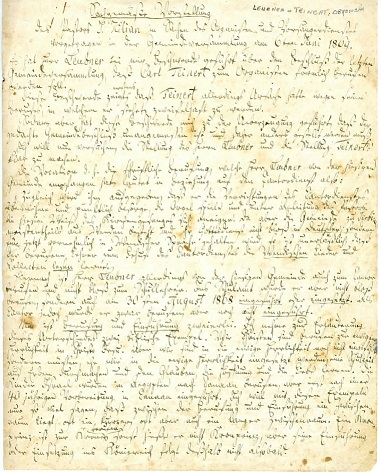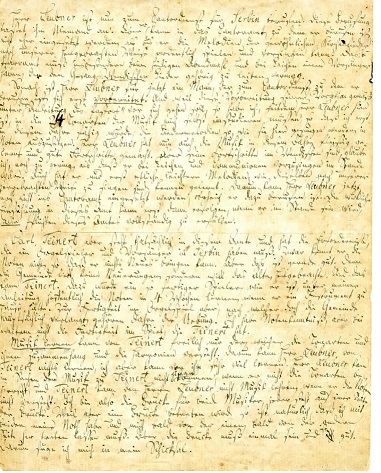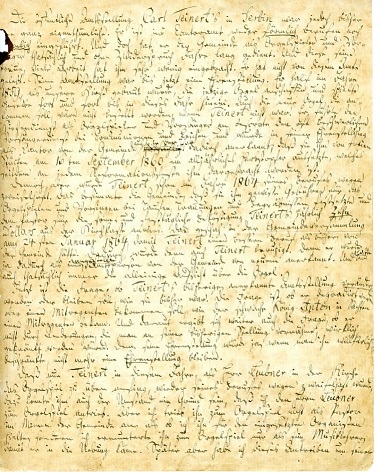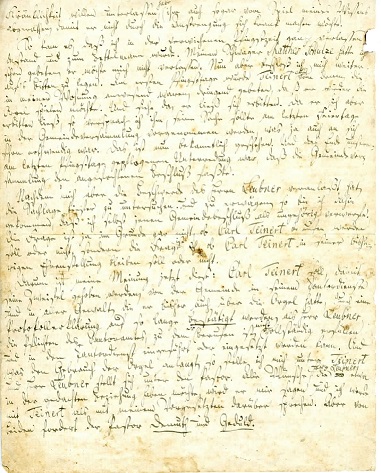Report on the Interviews with Organists, Leubner and Teinert
By Pastor J. Kilian in matters of the organist and song leader positions presented to the congregation meeting on June 16, 1869.
Mr. Leubner had brought to me his complaint about the decision of the last congregation meeting, that Carl Teinert should be formally called as
organist.
The complaint showed, first of all, that Teinert had reason to be concerned that his call, which he now had, was called into question.
But then, this complaint led me to the conviction that the proposed decision of the congregation was unfounded, and therefore had to be resolved in a
different way.
I will now try to clarify the position of Mr. Leubner and the position of Teinert.
This year’s document of the written call, which Mr. Leubner received from our congregation, reads, in regard to his serving as the Cantor, as follows:
“At the same time, the assignment is given to him that he take over the responsibilities and punctually to serve as the Cantor, to play the organ,
and, under the supervision of the Pastor, to learn the local way of singing the hymns”. But since the congregation in Serbin consists of mostly Wends
and its worship services are conducted not only in German, but for now primarily in the Wendish language, so it is imperative that the called teacher,
to be able to carry out the service of the Cantor, would learn to read the Wendish hymns and collects.
Accordingly, Mr. Leubner was truly called by our congregation to be the Cantor, and not just to be the school teacher. He was not only called to the
office of school teacher, but was, on August 30, 1868, installed or inducted. As Cantor, he was certainly called, but not yet installed.
Now, calling and installation are two different things. To explain this difference, I will use two biblical examples. We Christians are called to
eternal glory in Christ Jesus. But we have yet not been installed in eternal glory, but before we are installed in eternal glory, we must still
experience our earthly schooling and learn faith, hope and love. The Children of Israel were called to Canaan, but only after 40 years of preparation
were installed in Canaan. With these examples, I only want to show that between calling and installation there lies a space in between, often a
shorter one, but also often a longer one. A called crown prince, is called to the crown, otherwise he could not be called “crown prince”. But his
installation into the kingdom does not thereby follow immediately.
Mr. Leubner has now been called to serve as the Cantor in Serbin. No one will deny him this call. But he cannot be installed into the office of Cantor
to which he has been called, before he can play our church hymns that we use in an orderly way, and to lead the singing. The Pastor requires,
especially for the Holy Communion and for funerals, to have a song leader who can properly lead the Wendish hymns.
So now, Mr. Leubner is for now a man, who has been called to serve as the Cantor, who first has to prepare himself. And while this preparation,
according to his call, should be under the supervision of the Pastor, so I have, since Mr. Leubner has been here, had to study the 2/4 musical tone
arts, so that I would be competent this year to arrange the hymn melodies the way they are to be sung here. Mr. Leubner has also this year faithfully
studied this music and has made good progress. But, I believe, his progress in Wendish is still insufficient that he could be in a position to lead
the singing for funerals and communion. Also, he has now only learned several of the easier melodies, how these, according to our customary ways, are
to be sung. Therefore, Mr. Leubner cannot yet be installed into the office of Cantor, even though he has been called to it. The actual installation to
this office can follow only after he is in a position to completely fulfill all the duties of this office.
But, Carl Teinert actually is serving in this office, and has the requirements that an organist and song leader in Serbin has to have, although he
does not know the notes, so that nothing new can be brought in. And that is actually good, because the congregation does not love anything new, but
wants to keep the old things that were brought here. And Teinert can do this. For this, the accomplished player that he is, under my supervision, he
could learn the notes in almost four weeks if he could have an instrument in his home. But to complete the preparation for playing the organ, which
the congregation especially requires, belongs to years of practice. But I don’t have the knowledge of the note recognition and furthermore the
proficiency in playing that Teinert has.
Only those who could certainly learn music from Teinert are those who understand the tonal arts and their relationships and the harmonies. Therefore
Mr. Leubner can learn nothing from Teinert, but I can learn a lot from him. Mr. Leubner cannot come to Teinert for matters in music when he has not
mastered the tonal arts. And Teinert cannot teach Leubner music when he does not understand them. I am, therefore, the bridge for both musicians, each
standing on one side of the bridge. But since only one can step unto the bridge, it is natural that I would have my concern for both of them, and soon
have to be separated from one or the other side. But the bridge has to be made and that is good. Therefore, it seems to be my destiny to do this.
The present placement of Teinert in his office was still, up to now, a unique one. He was neither formally called nor installed into the office of
Cantor. And still he has served the congregation as organist and song leader for years without opposition. And this, his faithful service, has
provided him with little income. He did not make a living from this office. His position in this office was up to now an honorary position. In 1859,
when our church was being built, he helped to acquire the present organ and played the same on and on into this year. Also the organ, which is to be
coming, would not have been obtained without Teinert. He served the church as organ player and song leader, and took care of the often difficult
service of song leader for communions and funerals. And he was recognized by the congregation in his honorary position as Cantor during those years.
So that on September 10, 1860, an unrestricted yearly harvest offering was granted to him, which is brought for him on each Reformation festival.
After that, in 1864 his calling was not held in question. That was indicated when he was assured of certain benefits for his organ playing and song
leading at baptisms, weddings, and funerals and that he was to be paid by the Pastor, out of the church treasury, for his Sunday and Festival days
expenses, a yearly sum of $10.00. This happened in the congregation meeting on January 24, 1864, whereby Teinert had a good calling, as he had up to
then received from the congregation. With this, Teinert was satisfied. For through this, it was understood that he was as an official person, now
newly affirmed by the congregation. And he also always really had the sole oversight of the organ.
Now it’s the question, whether Teinert’s, up to now, recognized official office, should be changed or stay the same as it was up to now. The question
is, whether he should be demoted or become an assistant. And that leads to the further question whether, through changes concerning his present
position, really should be made. Then his honorary position, which would be willfully limited, would no more remain an honorary position.
Now Teinert, in this year in which Mr. Leubner received from the church the practice of organ playing, may have become doubtful of his call, and
under the circumstances might have had grounds, that I had urged Mr. Leubner to play the organ. But I encouraged him to play the organ, not as the
Pastor in the name of the congregation, or considered him to be the installed organist, but only as a musician that he would get into the practice.
Later, I refrained from this urging because of his sickliness. And I also advised him against learning from my knowledge of playing so that, through
the stress of it, he might not make himself sick.
So it came about, that in the past Pentecost season, I stood there completely forsaken, and had become a beggar. I had asked my brother-in-law,
Matthes Schulze, that he would not leave me. Now I decided further that I would be the beggar. On the first day of Pentecost, Teinert was urgently
requested, by those who were present at my home, that he would continue to play the organ. And you can see that he complied to our plea. But since he
agreed to our request, I promised him that this matter would be brought up at the congregation meeting on the last festival day, which was in itself
necessary. That has now occurred, as you know. And the result of our appropriate discussion, on the last day of Pentecost, was that the congregation
meeting would accept our proposed decision.
After the complaint of Mr. Leubner, that came to me, I was persuaded to investigate and to consider the state of affairs, so that I came to the point
that I myself concluded that that congregation decision was unfair. The question then, basically, is not at all whether Carl Teinert should not be
called, but the question is whether Carl Teinert should remain in his present honorary position, or not.
Therefore, my view now is this: That the doubts about Carl Teinert’s position should herewith be lifted from the congregation, regarding his serving
as Cantor, and that the authority that he had up to now over the organ, should by an official declaration, be confirmed as long as Mr. Leubner has not
fully achieved the responsibility for the office of Cantor to which he has been called, and to which he cannot yet be installed or inducted. And what
belongs to the use of the organ, I place myself under Teinert, and Mr. Leubner places himself under the Pastor. All questions, regarding this proposed
relationship, that some might have, he should tell me, and I will talk to Teinert, as my superior, about it. But from both, the Pastor asks for
humility and patience.
[Translated by Ed Bernthal]
Sachgemäser Vorstellung Leubner und Teinert Organiste
Des Pastors J. Kilian in Sachen der Organisten und Vorsängerdienst vorgetragen in der Gemeindeversammlung am 6ten Juni 1869.
Es hat Herr Leubner bei mir Beschwerde geführt über den Beschlus der letzten Gemeindeversammlung das Carl Teinert zum Organisten förmlich berufen
wereden soll.
Die Beschwerde zeigte erstens das Teinert allerdings Ursache hätte wegen seinen Berufs in welchen er stehet zweifellhaft zu werden.
Sodann aber hat diese Beschwerde mich zur Überzeugung geführt das der gedachte Gemeindebeschlus unangründenten ist und daher anders gestalt werden
mus.
Ich will nun versuchen die Stellung des Herrn Leubner und die Stellung Teinerts klar zu machen.
Die Vocation d.j. die schriftlige Berufung welche Herr Leubner von der hiesigen Gemeinde empfangen hatte lautet: “Zugleich wird ihm aufgegeben das er
die Verrichtungen des Cantordienstes übernehmen und pünktlich besorge, die Orgel spiele und Unterleitung des Pastors die hiesigen Weise des
Kirchengesänges sich aneigen” Da aber die Gemeinde zu Serbin meistenfals aus Wenden bestäht und die ihr Gottesdienst nich blos in Deutschen sondern
für jetzt vorwahrlich in Wendischer Sprache gehalten wird, so ist unerlästlich das der berufene Lehrer zum Befügt des Cantordienstes die Wendischen
Lieder und Collecten lessen lerne.
Hierauf ist der Herr Leubner allerdings von der hiesigen Gemeinde auch zum Cantor berufen und nicht blos zum Schullehrer. Das Schulamt wurde er aber
nicht blos berufen, sondern auch am 30sten August 1868 eingeführt oder eingesetzt. Als Cantor jedoch wurde er zwar berufen aber noch nicht
eingeführt.
Nun ist Berufung und Einführung zweierlei. Ich nehme zur Erleuterung dieses Unterschiedes zwei Biblische Example. Wir Christen sind berufen zur
ewigen Herrlichkeit in Christo Jesu. Aber wir sind in die ewige Herrlichkeit noch nicht eingeführt sondern musten, ehe wir in die ewige Herrlichkeit
eingesetzt werden nun Schulzeit auf Erden durchmachen und den Glauben, die Hoffnung und die Liebe lernen. Die Kinder Isräl wurden in Egypten nach
Canaan berufen, aber erst nach einer 40 Jährigen Vorbereitung in Canaan eingeführt. Ich will mit diesen Example nur so viel sagen das zwischen der
Berufung und Einführung ein Zwischenraum liegt, oft in kurzere oft aber auch ein langer Zwischenraum. Ein Kronprinz ist zur Krone berufensten sonst
heist er nicht Kronprinz aber seiner Einführung oder Einsetzung ins Königreich folgt deshalb nicht alsobald.
Herr Leubner ist nun zum Cantordienst für Serbin berufen. Diese Berufung läset ihm nimand an. Aber er kann in das Cantoramt zu dem er berufen ist
nicht eher eingesetzt werden als das er die Melodian gewöhlichen Kirchenlieder nach unser langbrachten Weise ordenlich spielen und vorsingen kann.
Das Pfaaramt mus uns besonders bei den heiligen Abendmahl und bei Leichen einen Vorsinger haben der Gesang Wendischen Lieder gehörlich zu leiten
vermag.
Sonnach ist Herr Leubner für jetzt ein Mann, der zum Cantordienst zu dem er berufen ist sich erst vorbereitet. Und weil diese Vorbereitung seinen
Vocation gemäs unter der Anleitung des Pastors vor sich gehen soll, so habe ich, seitdem Herr Leubner hier ist, in die 2/4 Tonnarten der Musik mich
selbst einstudüren musste, so das ich erst in diesem Jahre fähig wurde, die Liedermelodian so, wie sie hier gesungen werden in Noten auszusetzten.
Herr Leubner hat nun auch die Musik in diesem Jahr fleislich gelernt und gute Fortschrift gemacht. Aber seine Fortschrift im Wendischen sind, glaube
ich, noch zu gering, als das er die Leichen und Communion vorzusingen ins Stande waren. Auch hat er nur erst etliche leichter Melodian, wie dieselbe
nach unserer hergebrachten Weise zu singen sind können gelernt. Darum kann Herr Liebner jetzt noch nicht ins Cantoramt eingesetzt werden, obgleich er
dazu berufen ist. Die wirkliche Einführung in dieses Amt kann erst dann erfolgen, wenn er im Stande sein wird all Pflichten dieses Amtes vollständig
zu erfüllen.
Carl Teinert aber steht tatsächlig in diesem Amte und hat die Erfordernieste die im Orgelspielen und Vorsänger in Serbin haben mus. Zwar konnte er
die Noten nicht so das er nichts neüs bringen kann. Aber das ist gerade gut, denn die Gemeinde liebt keinen Neürungen sonden wolle das alte
hergebrachte. Und das kann Teinert. Dazu wurde ein so fertiger Spieler wie er ist unter meiner Anleitung fastenlich die Noten in 4 Wochen lernen
wenn er ein Instrument zu hause hätte. Zur Fertigkeit im Orgespiel aber nach welcher die Gemeinde hauptsächlich verlangt gehörn Jahre der Übung. Ich
habe Notenkenntnis, aber bei weitern nicht die Fertigkeit im Spiel die Teinert hat.
Musik lernen kann von Teinert freilich nur dan welcher die Tonarten und ihren Zusammenhang und die Harmonium versteht. Darum kann Herr Leubner von
Teinert nichts lernen, ich aber kann von ihm sehr viel lernen. Herr Leubner kann in Sachen der Musik zu Teinert nicht hierankommen, wenn er nicht die
Tonarten beherrscht, und Teinert kann den Herrn Leubner nicht Musik lehren wenn er die nicht versteht. Ich bin also die Brücke für beiden Musikanten,
jeder steht auf einer Seite der Brücke. Weil aber einer Brücke betreten wird so ist natürlich das ich mit beiden meine Noth habe und mich bald von
der einere, bald von den andern Seite her trenten lasten mus. Aber die Brücke mus einmal sein und ists gut. Darum füge ich mich in mein Schücksal.
Die bestentliche Amtstellung Carl Teinert in Serbin war jedoch bisher ganz eigentheumliche. Er ist ins Cantoramt weder förmlich berufen noch förmlich
eingeführt. Und doch hat er der Gemeinde als Orgelspieler und Vorsänger tatsächlich und ohne Zwiderspruch Jahre lang gedient. Und diesen seinen
treün viele Arbeit hat ihm sehr wenig eingebracht. Er hat nicht von diesem Amt gelebt. Seine Amtstellung war bis jetzt eine Ehrenstellung. Er half
im Jahre 1859 als unsere Kirche gebaut wurde, die jetzige Orgel anschaften und spielte dieselbe fort und fort bis in diesem Jahre hinein.. Auch die
neü Orgel die ankommen soll wäre nicht bestallt worden wenn Teinert nicht war. Er führte den Kirchendienst als Orgelspieler und Vorsänger an
besorchte den oft beschwärlichen Vorsängerdienst bei Communion and Leichen und wurde in seiner Ehrenstellung als Cantor von der Gemeinde auch in der
Jahre dadurch anerkannt, das sie von freien Stücken am 10 September 1860 ein alljährlich Herbstopfer ausetzte, welches seitem an jeden
Reformationsfest ihm dargebracht worden ist.
Dannach aber wurde Teinert schon im Jahre 1864 seines berufes wegen zweifelhaft. Das bestimmte die Gemeinde das sie ihm gewiste Gebühren für das
Orgelspiel und Vorsingen bei Taufen Trauungen und Begräbnisen festsetzte und dem Pastor für die Sonn und Festtägliche Bekostigung Teinert jährlich
Zehn Dollars aus der Kirchenkaste anweis. Das geshah in der Gemeindeversammlung am 24sten Januar 1864, damit Teinert einen besten Beruf, als bisher
von der Gemeinde hatte. Dadurch wurde auch Teinert beruhigt. Denn er wurde dadurch als angenommen Amtsperson von der Gemeinde von neür anerkannt.
Und hatte der auch tatsächlig immer die alleinige Aufrecht über die Orgel.
Jetzt ist die Frage, ob Teinert’s bisherige annerkannte Amtsstellung verändert werden oder bleiben soll, wie bisher war. Die Frage ist, ob er
degratiert werden oder einen Mitragenten bekam. Und darum ergibt sich weiter auch die Frage, ob er nicht durch Änderrungen, die mann an seine
bisherigen Stellung vormachen, wirklich getränt werden wolle. Dann seine Ehrenstellung wurde ja wenn man ihn willfürlich beschränkt nicht mehr eine
Ehrenstellung bleiben.
Das nun Teinert in diesem Jahre als Herr Leubner in der Kirche das Orgelspiel zu üben emfing, wieder seines Berufes wegen zweifelhaft wurde dazu
könnte ihm auch der Unstand ein Grund sein, das ich den Herrn Leubner zum Orgelspiel antrieb. Aber ich triebe ihn zum Orgelspiel nich als Pastor im
Namen der Gemeinde an als ich ob ich ihn für den eingesetzten Organisten hielten sondern ich ermunterte ihn zum Orgelspiel nur als sein Musiklehrer
damit er in die Übung kam. Später aber habe ich dieses Antreiben um seiner Kranklichkeit willen unterlassen habe ich auch sogar vom Spiel meines
Wissens abgeratten damit er nicht durch die Anstrengung sich krank machen wohle.
So kam es, das ich in der verwichenen Pfingszeit ganz verlassen dastand, und zum Bettelman wurde. Meinen Schwäger Matthes Schulze hatte ich schon
gebeten er möchte mich nicht verlassen. Nun aber beschloss ich mich weiter aufs bitten zu legen. Im ersten Pfingstage wurde Teinert auch von diesen
Einen die in meiner Wohnung anwesend waren dringend gebetten, das er sich aber Orgelspielen möchte. Und siehe das er lies sich erbitten. Da er sich
aber erbitten lies, so versprach ich ihn seine Sache sollte am letzten Feiertage in der Gemeindeversammlung vorgenommen werde, was ja auch an sich
schon nothwendig war. Das ist nun bekänltlich geschehen. Und das Ende unsern am letzten Pfingstage geschlachenen Unterredung war, das die
Gemeindeversammlung den angesachten Beshlus faste.
Nachdem mich aber die Beschwärde des Herrn Leubner veranlast hatte die Sachlage liesen zu untersuchen und zu erwögen so bin ich dahin gekommen, das
ich selbst jener Gemeindebeschlus als ungehörig verwürfe. Die Frage ist ja im Grunde gar nicht, ob Carl Teinert berufen werden soll nicht, sondern
die Frage ist ob Carl Teinert in seinen bisherigen Ehrenstellung bleiben soll oder nicht.
Darum ist meine Meinung jetzt diese: Carl Teinert soll, damit zum Zweifel gehoben werden von der Gemeinde in seinem Cantordienste und in aller Gewalt
die bisher auch über die Orgel hatte, durch einer Protokollerklärung auf so lange bestätigt werden. als Herr Leubner die Pflichten des Cantordienstes,
zu dem er berufen ist nicht vollständig erfüllen und in dem Cantordienst eingeführt oder eingestetzt werden kann. Und dasGebrauch der Orgel anlangt
so stell ich mich unter Teinert, und Herr Leubner stellt sichunter den Pastor. Alle Wünsche Herr Leubner die etwas in der gedachten Beziehung haben
möchte, wird er mir sagen und ich werde mit Teinert als meinen Vorgesetzten darüber sprechen. Aber von beiden fordert der Pastor Damuth und Geduld.
[Transliterated by Ed Bernthal]



